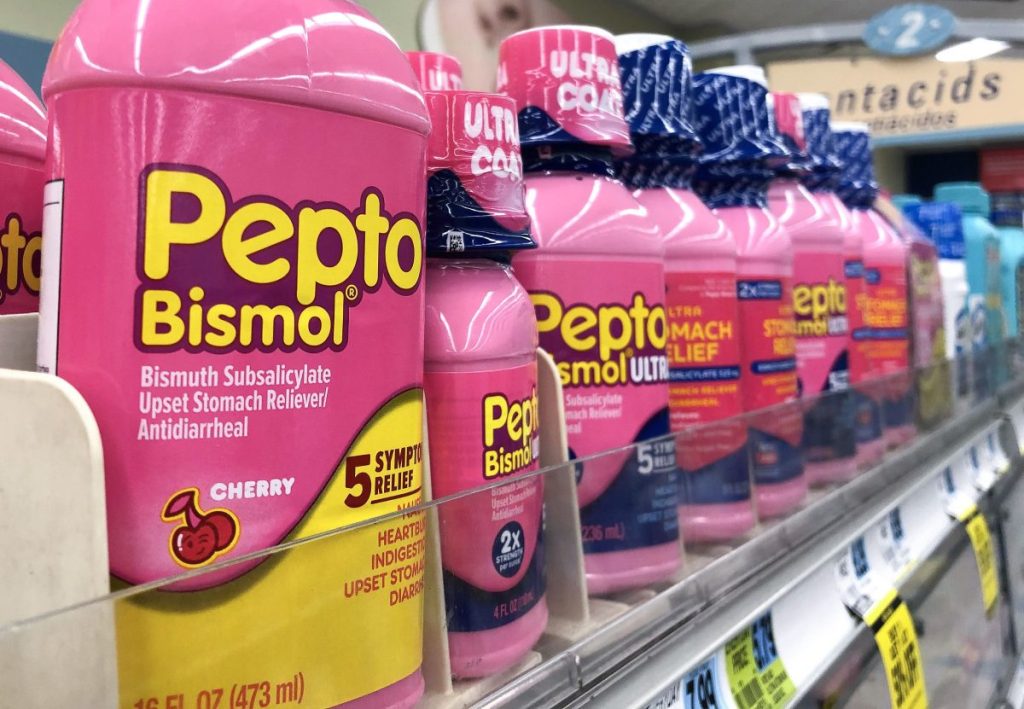You might thing Pepto Bismol for dogs would be a good idea if your dog suffers from diarrhea, upset stomach, or digestion problems. Humans often use Pepto Bismol to treat minor gastrointestinal symptoms, but can you give it to your dog?
Can you give a dog Pepto Bismol? The answer to that question is technically yes, you can give Pepto Bismol to your dog to treat their tummy troubles, but NOT without asking your veterinarian, first. In many circumstances, this over-the-counter medicine can make your dog sicker, it can mask signs of severe illness, and it can be difficult to determine a safe dosage.
Here’s what you should know about giving Pepto Bismol to dogs.
What Can Pepto Bismol Treat In Dogs?

Pepto Bismol treats minor cases of upset stomach, diarrhea, nausea, and digestion-related issues. The active ingredient in the medication, bismuth subsalicylate, has antibacterial and antacid properties.
It can suppress a hormone that causes diarrhea and help coat the digestive tract to reduce the irritation that can be caused by diarrhea and vomiting.
This medication is not meant to be a long-term solution for chronic digestion problems. If your dog experiences multiple symptoms, extreme symptoms, chronic symptoms, or symptoms that last longer than 24 hours, do not bother with this or other antacids, and see your veterinarian immediately.
When Is Pepto Bismol Bad For Dogs?
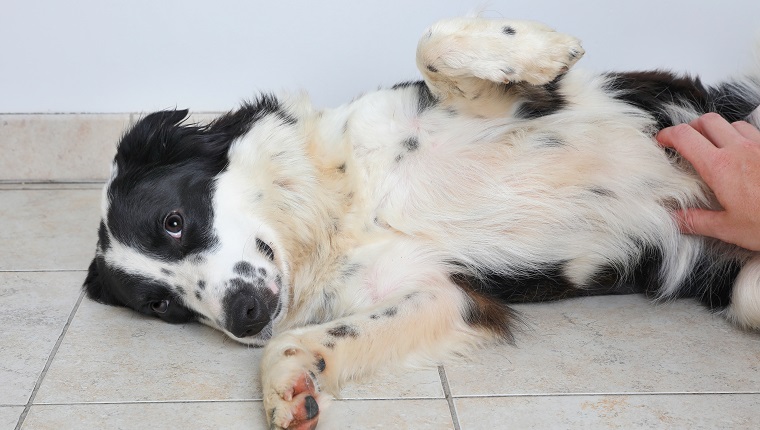
There are certain cases where Pepto Bismol can be harmful to dogs or make symptoms worse. That is why it is so important that you consult your veterinarian before giving it to your dog.
One of the ingredients in many Pepto Bismol formulas is salicylic acid, which is also found in aspirin. While salicylic acid has anti-inflammatory properties, it can also cause upset stomach and gastric bleeding.
Pepto Bismol also tends to turn dogs’ stools a greenish-black color, which can make it hard to tell if your dog has blood in their stool — an indication of a more serious health issue.
Here are a few of the other situations where Pepto Bismol can be dangerous for dogs:
- Other medications. If your dog takes other drugs, even over-the-counter drugs, they might interact poorly. This is especially true for steroids or NSAIDs.
- Medical conditions. Certain conditions might be worsened by Pepto Bismol, so consult your veterinarian. Dogs who suffer from bleeding, clotting, or platelet disorders are especially at risk for complications.
- Sensitive digestive tract. The medication may disagree with dogs who have “weak stomachs” or often suffer from gastrointestinal upset.
- Allergies. Some dogs may be allergic to Pepto Bismol, and dogs who are allergic to aspirin should not take it.
- Pregnant or nursing. Dogs who are pregnant or nursing should almost never be given medication without veterinary approval, and bismuth subsalicylate can be especially harmful to these dogs.
Can My Dog Overdose On Pepto Bismol?
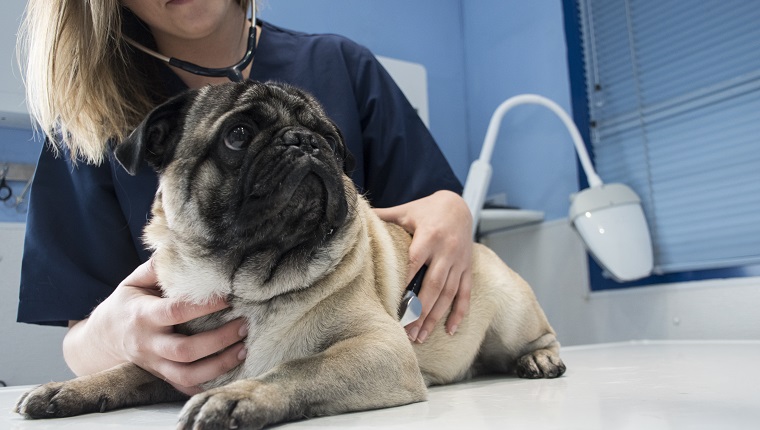
If you suspect your dog has accidentally consumed too much Pepto Bismol, contact an emergency veterinarian immediately. The compounds in this medication that are also found in aspirin can poison dogs if taken in high enough quantities, and that can be life-threatening.
If you can’t contact an emergency veterinarian, you may want to try the ASPCA Animal Poison Control hotline at (888) 426-4435, which is available all day, every day. You may be charged for that service, but it’s worth it to save your dog’s life.
Here are a few symptoms of overdose if your dog takes too much Pepto Bismol:
- Gastrointestinal issues (diarrhea, vomiting, blood in stool, etc.)
- Fever or overheating
- Changes in breathing
- Kidney failure
- Central nervous system issues (weakness, tremors, seizures, collapse, etc.)
How Much Should I Give My Dog?
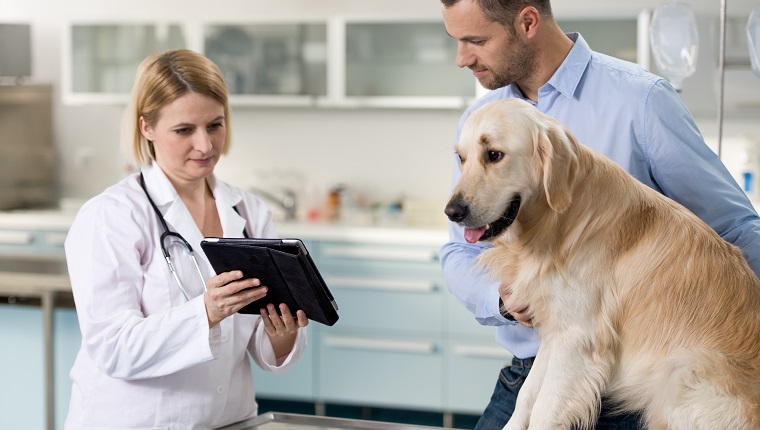
The proper dosage of Pepto Bismol for dogs depends on many factors, including your dog’s weight, breed, age, health, and other factors. The particular formula, whether it be extra strength, for children, a generic version, or something else will also affect the dosage.
That is another reason that you must consult your veterinarian before giving it to your dog.
It may also be difficult to administer the medication to your dog, as many dogs find the taste unpleasant. Your vet can give you recommendations on how to properly administer the drug.
The typical dosage that veterinarians recommend for dogs is one teaspoon for every ten pounds of body weight given every six to eight hours, though it may be completely different for your individual pet.
What Are Safer Alternatives For Dogs?
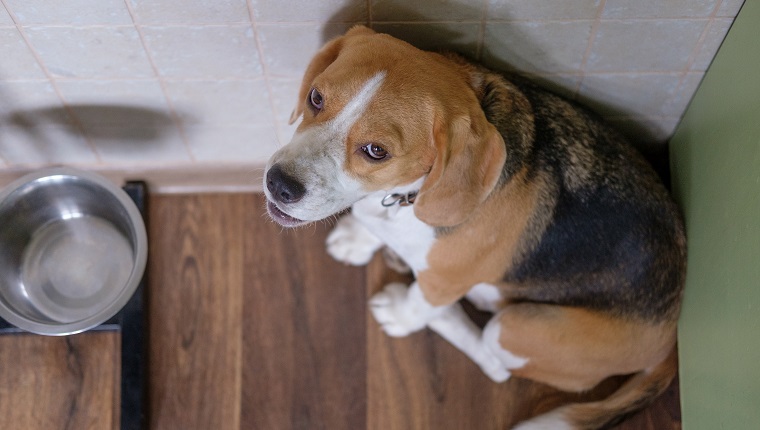
If your dog suffers from extreme diarrhea, vomiting, or stomach pain, you should obviously contact your veterinarian right away and not even bother with Pepto Bismol or antacids.
However, for mild stomach issues, vets often suggest fasting until your dog’s digestive system runs its course. They may also suggest reintroducing food in smaller portions or switching to a more easily digestible diet.
When vets do suggest using medication to treat mild digestion problems, they may prescribe medications other than Pepto Bismol, such as Pepcid, Imodium, or Corrective Suspension — basically a Pepto Bismol equivalent formulated specifically for dogs.
Again, do not give your dog any medications, even over-the-counter drugs, without asking your vet.
Certain foods can help firm your dog’s stools and improve digestion. Pureed pumpkin helps a good deal, and it is one of the top safe choices of dog parents to cure mild tummy troubles.
If your dog experiences frequent digestion issues, you may need to adjust their diet, or it may be a symptom of a bigger medical issue. Talk to your veterinarian about symptoms that concern you.
Have you ever given Pepto Bismol to your dog? Has your veterinarian recommended any alternatives to treat your dog’s tummy troubles? Let us know in the comments below!
Related Articles:
